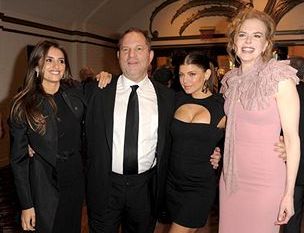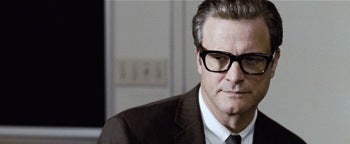For Harvey Weinstein, Tuesday’s Golden Globe nominations marked a moment of triumph after a rough couple of years. In the midst of downsizing and financial restructuring, the company led all studios with 12 Globe nominations for the films “Inglourious Basterds” (a co-production with Universal), “Nine” and “A Single Man.”
Weinstein wanted to talk to theWrap in the aftermath of the nominations; he started out in a taciturn mode, but became far more effusive when the talk turned to his company’s films, and its future.
You’ve been involved in plenty of awards seasons over the years. Do you go into a day like Tuesday with expectations, or do you try not to?
You go into that day with hope. And optimism.
 So you were optimistic that it would go well?
So you were optimistic that it would go well?
I was hopeful that it would go well.
Any big surprises for you among the nominations?
I’m never surprised. I was thrilled with the result. You can’t do better than this. It was just all good.
So what did you do that other studios didn’t?
We made better movies. Or good movies. I don’t know. We were lucky. Luck, tenacity, all of the above.
Do you think this will translate to the Oscars, or is that a completely different ball game?
I think that the HFPA is always a big bellwether of Oscar nominations to come.
How different is the climate this year? Given the economy, are you forced to campaign more frugally?
We all are.
So what do you do to get the most bang for your buck?
I think that you really have to have actors and directors generate publicity in the right circles, and do the right things. Like Q&As, where you can get close with the audience. I think that’s really important.
Out of the three Weinstein movies that got Globe nominations, “Inglourious Basterds” was the one that initially seemed to be a lot of fun, but probably not an awards movie. Did you know from the start that it was?
Yeah. The minute I read the script I knew it was going to be in awards season. The script was a masterpiece. You know, Quentin’s a brilliant writer. His scripts are so wildly interesting and innovative that when you read them you just go, “that’s it.”
Does it bother you that Rob Marshall didn’t get a directing nomination for “Nine”?
I’m disappointed, but that happens. It’s been a great year for films and directors, and sometimes I think people don’t take comedies or musicals seriously. I wonder whether Preston Sturges would be getting nominated right now. I don’t know.
 When you saw “A Single Man” at Toronto, what made you want it?
When you saw “A Single Man” at Toronto, what made you want it?
I knew Tom Ford, and Tom always says that when he said, “I want to direct a movie,” I was one of those guys who didn’t laugh at him. I always thought that he had a brilliant visual style. But what shocked me about this movie was not the visual style, it was the emotionality, the sensitivity of the piece, and the ensemble’s performance.
I was stunned that Tom got that performance out of Colin. I did seven movies with Colin, and he was brilliant for me in “Shakespeare in Love” and “Bridget Jones,” etc. etc, but this was astounding. It is a breathtaking piece of work. I saw Tom and I said, “Look Tom, you and I have always had a great relationship…” And he pretty much said, “If you want it, it’s yours.” That’s how it happened – with Bryan Lourd’s intervention, in a really positive way.
Are you disappointed that “The Road” hasn’t done better with nominations and critics awards?
Tremendously disappointed. But I think “The Road’s” gonna get a best picture nomination at the Oscars.
Really?
I really think that. I’m hearing too much anecdotal information from people telling me how much they loved the movie, how much they were moved by the movie.
What’s the difference between the Weinstein Company now and the company the last couple of awards seasons?
I think the thing that was missing with us for the first couple of years is that we didn’t do it ourselves, and now I think we are. It’s really just a matter of bearing down and realizing that your movies are your most important thing.
And your focus was elsewhere?
Well, I was building a company. And now the foundation of the company is there. And also, as we move some of the bigger assets, the other things that we were doing, into other hands, sell them, move them to other people and partner up, I now have 100 percent of my time …
Let’s put it this way: I had 50 percent of my time, maybe, to make movies when I started the company. Maybe 60/40 the other way. Now I would say the equation is 80 percent to concentrate on my movies. And I think it’ll be 90 percent by the beginning of the spring, and 100 percent thereafter.
But does the company have the money to produce a full slate of movies?
Of course. Obviously, that’s what the success has been all about, and we’re knee-deep into it. “Youth in Revolt” starts January 8, “Piranha 3-D” is April 16, Bob [Weinstein] is gonna start a whole new “Scream” trilogy. I’m doing a film with Anne Hathaway, and I’m gonna do “I Don’t Know How She Does It” with a pretty big star, we don’t have a deal yet but there are a lot of rumors out there that are true. I have “The King’s Speech” which is shooting now in London. “Nowhere Boy” and “Le Concert” are in the can …
I mean, the economic downturn took a bite out of everybody. We had to downsize the company, and there’s still some downsizing left, which we announced but haven’t finished doing yet. We know it has to be a leaner, meaner company. But we’re not doing 10 different things anymore, so the company is getting better. I think the financially community knows that, the people who are in the know know that.
Look, it’s been a rough time for the American independent industry. And the most important thing that the HFPA and Critics Choice did this year was honor a lot of independent films. “The Hurt Locker,” “Precious…” etc. I think that’s so bloody important with the demise of so many companies.
When I see Warner Independent, or my alma mater Miramax, or Paramount Vantage getting diminished or eliminated, rather than saddening me, I’m just so pissed off and angry about it. And that has just re-energized me. I think the way you do something about it is that you fight for the movies you love, and you fight for the kind of movies you love. And then you go back to the arena, and you just say, “Man, I’m gonna get down in the trenches and kick my actors’ asses to do the work they have to do.” And my own butt included.
I feel like, we started a revolution 25 years ago, and we’re about to begin another one. And I can’t end it any better than that.




